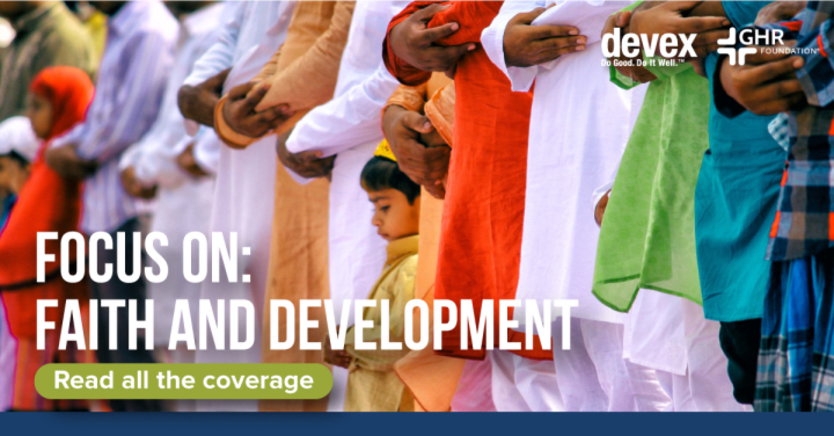
According to the recently published Global Report on Food Crisis mid-year update, up to 205 million people are expected to face acute food insecurity that puts them in need of urgent assistance, and the latest estimates show that this number could be as high as 222 million people this year.
Amid the growing crisis, faith-based organizations are among those stepping up. Barron Segar, president and CEO at the World Food Program USA said he was “incredibly overwhelmed” by the support the organization has received from FBOs.
Part of our Focus on: Faith and Development
This series illuminates the role faith actors and their communities play in strengthening global development outcomes.
“Faith-based partners inspire giving, inspire a connection to community,” he said. “I think faith-based organizations really believe that the world is one place, you love thy neighbor, as you love thyself, and, and the world.”
Speaking at a Devex event held on the sidelines of the United Nations General assembly, leaders of FBOs detailed some of the advantages of working with faith groups and communities when responding to the food crisis.
They represent communities with resources
Robert Hokanson, senior manager of global priorities and special projects at the Church of Jesus Christ of Latter-day Saints, said organizations such as his represent faith communities.
“A community by definition brings people together. And not just for a random reason, but brings people together for a common purpose, a common cause, united around common belief,” he said. “When that happens, you have the ability to marshal resources.”
Hokanson added that faith communities are able to mobilize cash donations very quickly but their real power lies in their ability to mobilize people who adhere to the faith. He said FBOs connect and engage with the local community and “can look out for others” and “watch for those who may be at risk or who are in need.”
“We don't have to wait for a formal call,” he said. “We're in a position that we can take action.”
They have greater access
Anwar Khan, president and co-founder at Islamic Relief USA, said faith groups are able to go to places others may not have access to, because of their cultural proximity and advantages of sharing the same faith.
“That brings down some of the barriers,” he said. “It helps to bring down walls.”
He added that faith groups also understand the religious cycles that people go through and are able to tailor their responses in a way that respects these cycles. Faith literacy — knowing the dietary restrictions, knowing when holidays fall, knowing when adherents are fasting — is important to having and maintaining access, he said.
They are first responders
Rudo Kayombo, chief operating officer at Food for the Hungry, said faith is active in many vulnerable communities long before humanitarians arrive — and FBOs are able to leverage the influence that faith leaders already have.
‘[Faith communities] are already building social cohesion well before we show up, and they will be there on the ground, way past the shock and the hunger crisis. So they are a key part of contributing to resilience building,” she said.
She added that such communities are key components in building resilience and social cohesion, and responders should leverage and make their work more effective, sustainable, and long lasting.
They have a trust advantage
Lheslye Pérez Santis, chief of party for communities leading development at Catholic Relief Services, added that the constant presence of FBOs and faith leaders has made them trusted partners.
“Because of our apolitical way of work, people can trust us. And this trust gives us the advantage of being the first to be called when an emergency happens,” she said.
She added that organizations looking to respond to the crisis should use the “deep knowledge” that FBOs get directly from the community and work through them when responding.
Watch the full event recording.









